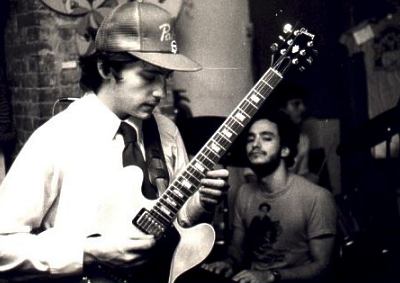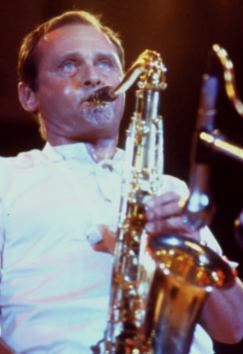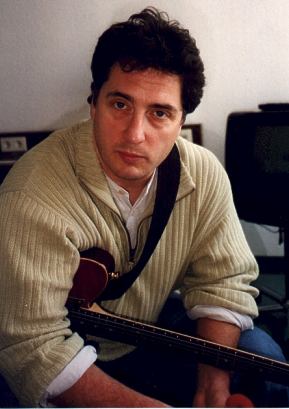 Hans Kumpf: I took this photo the first time I listened to
your music. Can you remember where this was?
Hans Kumpf: I took this photo the first time I listened to
your music. Can you remember where this was? Chuck Loeb: "The Turning Point"? My goodness! In Piermont. Unbelievable. I played together with Jack
Dryden on bass, Mike Pelera on piano, Charlie Camileri, Richard Perry on tenor saxophone, I can't remember the
drummer. That's too funny. 1979, so it's almost twenty years.
HK: When you performed in this club, you played more cool jazz. Four months later, in
December 1979 I heard with Stan Getz group in Stuttgart, South Germany. Then I really was
astonished, because you played stronger, even "punk music", like I've written in
a newspaper review. CL: I don't know whether it was "punk"! You liked more
the cool stuff then.
HK: How do you recall your time with Stan Getz?
CL: It was an amazing thing for me. To be 22, 23 years old and to be asked to play with
Stan Getz was like a dream come true. I’ve always been involved not only as a guitar
player but also as a composer. Stan was not a composer, so he was always looking for other
people to write music for his group. He asked me to write for him, Andy LaVerne wrote
music for him. So I not only to got play with this guy, but I also had my music performed
by this
great jazz group all over the world, traveling to the jazz festivals and meeting all these
people, an amazing experience that was very important for my development, I think.
HK: I liked his soft, warm and human sound very much. On the other hand, Getz was a
nervous person with many problems. How would you describe him as a person?
CL: It's interesting. First let me say this: He really had a very big influence on me in
his way, he always made a lot of his beautiful warm, love sound. When he played the
saxophone it was like that. I tried to make the emphasis on getting a pretty sound on the
guitar when I play. I think this is important. As a person, Stan was a kind of difficult
– this is the best way to say. He had a lot of problems, you know. He had drug
problems, drinking problems
and stuff like that. That became evident in his personality. I had seen him be very
nervous and not so nice to certain people. But I have to say with a few exceptions he was
very nice to me.
 HK:
What did you learn musically from him?
HK:
What did you learn musically from him?
CL: Many things, but one is really putting emphases on sound and warmth... This guy played
a few notes, and he would draw the whole audience to him. The other thing that was great
about Stan is economy. He didn't have to play a lot to say a lot. And I think that's
stayed with me also. As a bandleader he was very good at designing what to play and who do
let play. He was very democratic, he let us play a lot. It wasn't that like we were just
accompanying Stan Getz. He wanted us to play. That made an influence on me. When I had a
band I wanted to feature everybody, and tried to make a program that was balanced.
HK: Now, you do your own stuff. What do you feel like most: like a guitar player, a jazz
composer, or even like a composer for TV? Or as a producer?
CL: Everything that I do musically really comes out of playing the guitar, because I
learned how to compose on the guitar, I even learned to arrange on the guitar. So it all
comes down to being a guitar player. However, as a person, I really like to be involved in
the big picture, the whole thing. If I had to write a business card it would say,
"Chuck Loeb: guitarist, composer, producer." Because I think everything is
equal. But it was really starting with the guitar. I spent many, many, many years in the
studio working many, many hours, working on records, on films and on TV. I had
all that experience and I really enjoyed it. So it was a natural thing for me to move from
that into things like producing records. The expression "soup to nuts" –
like a whole meal from the beginning: the main course, the dessert.. I like to see how the
whole process happens. Somebody comes with project, a song, an artist, and then trying to
arrange this song, how the recording process should be, who the engineer should be, mixing
this song, which order will come on the CD, and the cover. I like that.
HK: What kinds of guitars do you play?
CL: I have solo guitars from many years. I played a electric guitar called Pensa / Suhr.
Recently I started to play this guitar, which is a YAMAHA Pacifica USA. This is a new one,
I got it last week. They are helping to get to the point where I feel totally comfortable.
For acoustic guitars I play two different kinds – for steel string I play Taylor, for
classical I play Ramirez, a Spanish guitar, which belongs to my wife.
HK: Do you combine synthesizers with your guitar?
CL: I also do a lot keyboard programming for my records. This has less to do with the
guitar than with arranging an composing. But on stage basically I just use simple effects,
some reverb and delay. Some stuff I do has a harder rock sound, so I use an amplifier
called AXSys2 from Line 6. It has digital storage for all these settings, things are
getting very sophisticated that way, I used to bring to a million pedals and wires and
cables. Now all I have this basically one thing (this guitar).
HK: Back to the roots!
CL: Yeah!
HK: It could be the other way, that you could sound like a vibraphone or like chimes and
so on. It's all possible, you know.
CL: It's interesting. Few years back, it was very popular for people to play a
guitar synthesizer. In fact, when I was in Steps Ahead, I played guitar synthesizer. There
was no keyboard in the band, so I got the chance to really experiment with that. I
remember, I listened to the radio one day – and there was a flute solo, a synthesizer
flute. And at the end of the record the person announcing on the radio said: "That
was Lee Ritenour from his new record". I realized I would much rather really play the
guitar than play the flute. Now I try to do all the keyboard stuff separately, and when it
comes time to play the melody and the solo, I take the guitar.
HK: You played with many musicians, did a lot of studio work, and met a lot of musicians.
What do you think about European musicians like drummer Wolfgang Haffner?
CL: Oh man, Wolfgang is really one of my favorite drummers. I love playing with him, and
we are were close as people. He was recommended to me, when we were putting together the
band called "Metro", I think four or five years ago. We had Anthony Jackson
playing bass. We said, we're not sure who the drummer’s gonna be. The first gigs were
in Germany. He said: "I've just come from Germany and I played with this guy Wolfgang
Haffner – and he was incredible". So he got me involved, it came from Anthony
Jackson. From the first minute it was great playing with him. Through Wolfgang I met a lot
of great European musicians; I met Till Broenner, with whom we just did a record with in
New York, a beautiful record, all ballads. You know some of the other people like Roberto
Di Gioia (p), Patrick Scales (b-g) and also another bass player Christian Deiner, so I'm
meeting more people here in Germany. And I meet people in Spain also, because my wife is
from Spain. To me, a musician is good whether he lives in Alaska or in New York, it
doesn't matter.
 HK:
Before we started, you mentioned some clarinetists: You played together with Eddie Daniels
and Richard Stoltzman. Your impressions? Your answer interests me, because I'm a
clarinetist, too.
HK:
Before we started, you mentioned some clarinetists: You played together with Eddie Daniels
and Richard Stoltzman. Your impressions? Your answer interests me, because I'm a
clarinetist, too.
CL: Six or seven years ago I started to play with Eddie. The first one was on Eddie
Daniels Collections with the pieces "Sun Dance" and "Equinox" (with
John Patitucci on bass, Dave Weckl on drums and Sammy Figueroa on percussion). I made
three or four records with him. I knew him before that because we did sessions together,
studio recordings together. But we first started playing jazz together then. We developed
the relationship. Eddie is too busy to do a lot of classical concerts all over the place.
But every year we get one or two things to play together, doing a
record or we play in Santa Fe, New Mexico, where he lives. I just think this guy is such a
virtuoso, he is really on the top in musicianship. So to me it's great. The sound that we
get between the guitar and the clarinet is very nice, soft, a combination sound, we have a
certain thing, it happens with the chemistry. Richard Stoltzman...
HK: He is also from the classical discipline.
CL: That's right. Eddie comes more from the jazz world. Richard came from the other way.
Richard comes from classical and goes to jazz, and Eddie comes from jazz more.
Working with Richard Stoltzman was really interesting because I not only wanted to play
jazz, he wanted me to play the piece "Pavanne" by Ravel, just myself and him and
Gary Burton. I was chicken-livered, because I was not a classical player. I was nervous.
But it came out good. He is a great player.
HK: Now you mentioned Gary Burton. How was it with the vibraphone players like Gary Burton
and like Mike Mainieri in Steps Ahead?
CL: Great. I think it's a beautiful sound those two instruments, guitar and vibes…
HK: Although the sound could be quite similar?
CL: It could be! The reason I love that sound is from guitarist Wes Montgomery, his
brother Buddy who plays vibes and George Shearing on piano. They made a record together
called George Shearing And The Montgomery Brothers. It's a beautiful record. That sound
was always in my head, so I love that combination. Also Dave Samuels is on my new CD. He
plays marimba, not vibes. It's a very organic sound – it’s like bells.
HK: What means "balance" to you? You’ve even used that word in an album
title.
CL: The thing that I was trying to emphasize with that title was the fact that at that
point I had become a father recently, four, five years before. I sometimes felt like a guy
walking a side road, the kids are on the one side, and family life and work and money,
trying to do television work, trying to do jazz, trying to be a father, trying to be on
the road, trying to be home. So in order to make all that work I felt that it really took
a lot of balance. The way I got the title was watching when Michael Jordan was playing
basketball: he was almost falling over, at the last minute he was
able still to focus and make this beautiful shot into the basket. I thought: That's what
it is. It's like things are always going on your life, but you have to have balance enough
to be able to get the ball into the basket, to able to do what you're trying to do.
HK: What ethnic music has influenced you?
CL: Once when I was with Stan we were going to India, we were playing at the Jazz Yatra
festival. In the mornings they had Indian concerts for us, for anybody, to go to. In the
evenings we were playing jazz. In the morning, I went to this concert. I noticed that they
were sitting there and tuning their instruments. But there was no break between tuning the
instruments and the song. They were just starting to play, and it became music. It was so
interesting. I listened to Indian music; of course, I love Brazilian music. My wife is
from Spain, so I got the advantage of really getting a taste of Spanish music. I often
spend time there with her family. All that stuff, also, with European classical music.
There is
a point of reference on my new CD: The song that my wife sings is coming from a Brazilian
feeling, with the marimba and percussion.
HK: Where are your personal roots? Loeb could be a German name.
CL: My father was born in Germany, in Duesseldorf, and being Jewish he had to leave when
he was ten. His parents moved to New York. He grew up in Europe, he speaks German. When I
was fifteen or sixteen he came back here, and I came with him for the first time since he
left.
© 1998 Hans Kumpf. Text and Photos - All Rights Reserved.